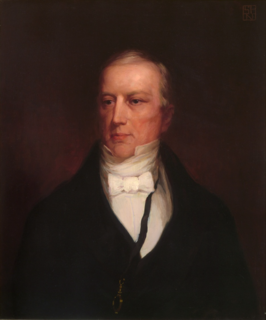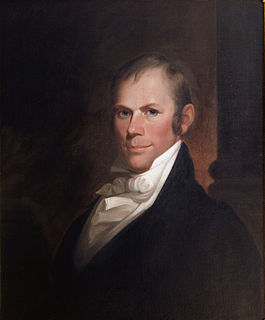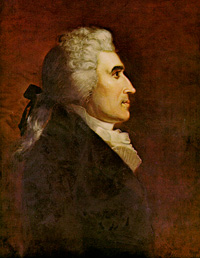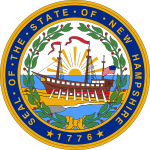
Elections to the United States House of Representatives for the 20th Congress were held at various dates in each state in 1826 and 1827 during John Quincy Adams's presidency.

Elections to the United States House of Representatives for the 18th Congress were held at various dates in different states between July 1822 and August 1823 during President James Monroe's second term.

Elections to the United States House of Representatives for the 5th Congress took place in the various states took place between August 12, 1796, and October 15, 1797. The first session was convened on May 15, 1797, at the proclamation of the new President of the United States, John Adams. Since Kentucky and Tennessee had not yet voted, they were unrepresented until the second session.

Elections to the United States House of Representatives for the 4th Congress were held on various dates in each state between August 25, 1794, and September 5, 1795 (Kentucky). The election was held during President George Washington's second term.

Elections to the United States House of Representatives for the 3rd Congress were held in 1792 and 1793, coinciding with the re-election of George Washington as President. While Washington ran for president as an independent, his followers formed the nation's first organized political party, the Federalist Party, whose members and sympathizers are identified as pro-Administration on this page. In response, followers of Thomas Jefferson and James Madison created the opposition Democratic-Republican Party, who are identified as anti-Administration on this page. The Federalists promoted urbanization, industrialization, mercantilism, centralized government, and a broad interpretation of the United States Constitution. In contrast, Democratic-Republicans supported the ideal of an agrarian republic made up of self-sufficient farmers and small, localized governments with limited power.

Elections to the United States House of Representatives for the 1st Congress were held in 1788 and 1789, coinciding with the election of George Washington as first President of the United States. The dates and methods of election were set by the states. Actual political parties did not yet exist, but new members of Congress were informally categorized as either "pro-Administration" or "anti-Administration".

New Hampshire's 2nd congressional district covers the western, northern, and some southern parts of New Hampshire. It includes the state's second-largest city, Nashua, as well as the state capital, Concord.

The 2008 United States elections were held on November 4. Democratic Senator Barack Obama of Illinois won the presidential election, and Democrats bolstered their majority in both houses of Congress.

Elections in the U.S. state of New Hampshire are held at national, state and local level. The state holds the first presidential primary in the national cycle. Elections for a range of state positions coincide with biennial elections for the House of Representatives.
The United States Senate elections of 1824 and 1825 were elections for the United States Senate that saw the Jacksonians gain a majority over the Anti-Jacksonian National Republican Party.

New Hampshire elected its members August 26, 1822. New Hampshire law required a candidate to receive votes from a majority of voters for election, that is 1/12 of votes. Only five candidates received the requisite majority, and so a May 11, 1823 run-off election was held for the sixth seat.

New Hampshire law required a candidate to receive votes from a majority of voters (10%). In the August 27, 1810 initial election, only two candidates won a majority, so a second election was held April 1, 1811 for the remaining three seats, after the congressional term began but before the Congress formally convened. The data from the source used give majorities to all the top five candidates, suggesting that the data are incomplete.

A special election was held in New Hampshire's at-large congressional district on August 28, 1797 to fill a vacancy created by the resignation of Jeremiah Smith (F) on July 26 of the same year. Smith had been appointed United States Attorney for the District of New Hampshire.
A special election was held in New Hampshire's at-large congressional district on August 25, 1800 to fill a vacancy left by William Gordon (F) resigning to accept an appointment as New Hampshire Attorney General on June 12, 1800.

New Hampshire elected its members between November 1, 1824 and March 8, 1825. New Hampshire law required candidates to receive votes from a majority of voters for election. As only five candidates received votes from a majority of voters, a run-off election had to be held for the sixth seat on March 8, 1825.

The 2014 United States House of Representatives elections in New Hampshire were held on Tuesday, November 4, 2014 to elect the two U.S. Representatives from the state of New Hampshire, one from each of the state's two congressional districts. The elections coincided with the elections of other federal and state offices, including Governor of New Hampshire and U.S. Senator.
This election marked the first time since 1992 that New Hampshire elected members of two parties into the House of Representatives, and as of 2019, it is the most recent time a Republican has been elected to Congress in New Hampshire.

The 2016 United States House of Representatives elections in New Hampshire were held on November 8, 2016, to elect the two U.S. Representatives from the state of New Hampshire, one from each of the state's two congressional districts. The elections coincided with the 2016 U.S. presidential election, as well as other elections to the House of Representatives, elections to the United States Senate and various state and local elections. The primaries were held on September 13.

New Hampshire state elections in 2018 were held on Tuesday, November 6, 2018, with the primary elections being held on June 5, 2018. Voters elected 2 members to the United States House of Representatives, the Governor of New Hampshire, all five members to the Executive Council, all 24 members to the New Hampshire Senate, and all 400 members to the New Hampshire House of Representatives, among other local elected offices.

New Hampshire state elections in 2016 were held on Tuesday, November 8, 2016. Voters elected 4 electors in the electoral college for President of the United States, one Senator in the United States Senate, 2 members to the United States House of Representatives, the Governor of New Hampshire, all five members to the Executive Council, all 24 members to the New Hampshire Senate, and all 400 members to the New Hampshire House of Representatives, among other local elected offices. The Democratic and Republican presidential primary were held on February 9, 2016 and the primary elections for all others offices were held on September 13, 2016.







